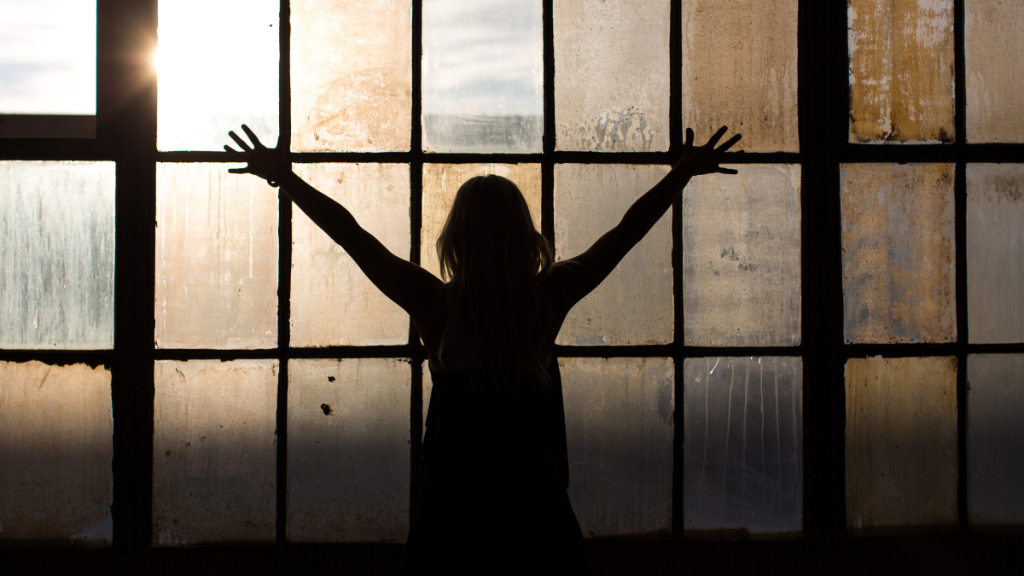
I first met Kelly McGuffie at a local Hope Writers event near Portland, OR. We instantly connected along with a few others and have continued to meet to encourage one another in our writing. Kelly is funny, fierce and it is a complete joy for me to introduce you to her.
Kelly writes about walking the pilgrimage of life. She feels closest to the divine when she is outside and once hiked 729 kilometers across Spain. Read more of her work at kelly.substack.com or on Instagram at @kelly_mcguffie. She lives and teaches in Oregon’s beautiful wine country with her husband and toddler. It’s a blessing to have Kelly at the table with us today.
Guest post by Kelly McGuffie
“They live in a glass house,” I overheard someone say about our pastors when I was a child. I imagined the beautiful glass house in my mind. It must be in the woods, I thought. Could they view the sunset through the trees? Instead of television, I pictured them watch squirrels hunt for acorns from the comfort of their living room recliners.
“We live in a glasshouse, Kelly,” a snarky adolescent me was told, as I rolled my eyes in church. By then, I understood the implication of those words. Translation: As a pastor’s kid, everything I did and said was a representation of our family, and our family represented the Church wherever I was, and the Church represented Jesus to the world. Think about that when you make choices, young lady.
I grew up, went to college, went to seminary, and married someone who took a job as a pastor.
Living in a glass house can be really fun.
Everyone knows your name. You get a lot of cash when you graduate high school because people feel invested in your life since they watched you grow up. You can freely roam the halls of empty church buildings after hours, finding abandoned libraries and forgotten storage closets. There can be a lot of perks, but being seen through glass walls doesn’t equate to being known.
I wanted to support my husband, but my own convictions were shifting and I couldn’t bury them. I saw nationalism creeping into the church walls, while freedom for marginalized people who I was taught were made in the image of God was being stripped away. I was seeing injustice and letting myself become numb to its effects on me—an Enneagram 8, a person who has a deep need to see justice in the world. Once in awhile I’d poke my toe in the water and post something mildly controversial on social media—aware that the district superintendent’s wife might call me up and make sure I was still saved. I reposted a fairly mild article chastising the president’s immigration ban and the next Sunday was offered snide remarks by another pastor.
The knowledge that anything I did, said, or wrote could put my husband’s career in jeopardy was paralyzing. I didn’t feel like I could open up with “church people.” Not only did Adam’s superiors care deeply about my convictions, so did all the people peering into our glass house: the congregation bearing witness as we demonstrated our family to our community.
The trouble is: glass houses are fragile. Yes, people throw rocks—but I was tempted to throw rocks too, and glass can break from the inside.
I glimpsed life outside the glass house when I walked the Camino de Santiago, an ancient spiritual pilgrimage across the countryside of Spain. There were big questions rolling around in my mind as I walked through the Spanish countryside.
Is there still faith on the other side of this?
Is there really a place for us? For me? For my doubt?
For the first time in my life, I was completely free from eyes peering into the walls of my life and inspecting me. I was anonymous.
Each day, I braided my hair, tightened my sandals over my wool socks, hugged my pullover onto my arms, and set off with 16th-century castles and cathedrals towering over me as the sun rose. I needed to feel the pull of the Earth on my body, meander through the woods alone for hours without seeing another soul, watch rays of sun flooding the tree-covered valley below. As I walked up hills and around bends, my body became a proxy for my prayers that didn’t have words.
The glass house was a greenhouse incubating rage:
Rage at the Church for letting us down again and again, rage at God for allowing us to be torn away from community, rage at myself for my unbelief. Breathing in fresh mountain air and hearing only the crunch of gravel beneath my own feet: I saw my rage in new light.
I’d stifled my side-eye when I heard words from the pulpit that aligned the Church with the flag. I’d painfully zipped my lips as best I could when people got up in arms about my LGBTQ friends wanting to enjoy the right to marriage. I didn’t argue when people got weird about drinking wine with dinner or beer with friends. I had toed the party line and almost lost myself along the way. I knew I couldn’t keep my faith and stay in a place where I felt like an outsider. I once heard it said, “Toxic people make you think you’re holding a grudge when you’re really holding a boundary.” Maybe my anger was actually there to teach me. Maybe I don’t have to force myself into tiny glass boxes when I was born to fly free.
It seemed I had outgrown the tradition I was handed as a child and didn’t know what was left on the other side. It wasn’t that I wanted to go back to believing things that were no longer true for me, but I also wanted to know where I fit. Who were my people? Did I belong anywhere? I called Adam and told him I couldn’t put myself back in that environment when I finished walking.
We chose our family and each other, free from the painful restrictions of glass house living, but leaving us spiritually homeless. Moving from a glass house to the world of spiritual anonymity can be simultaneously liberating and terrifying.
It is a truth universally acknowledged that the longer you are at a church, especially when you are “doing ministry,” the longer it takes to find a new home church that actually feels like home. Leaving ministry and trying to find church feels like trying to stay carnivorous when you’ve seen how the sausage gets made.
We visited the spectrum of church denominations, not sure where we fit anymore, no longer comfortable in the fellowship that had carried us through our most formative years and launched us into “ministry.”
We visited a church on the Joy Sunday of Advent, excited they observed Advent by lighting the candles together as a church. Then the pastor spent over an hour telling everyone that we were all terrible rotten sinners who deserved to go to hell. Where is the joy in that?
We attended a service held in a historic old church with echoing acoustics when, during a moment of profound silence, my nursing baby decided to start chugging milk with loud throaty gulps. I saw some friendly smiles and a few horrified faces.
We visited a painfully small congregation (literally a handful of people) on a Sunday the pastor was on vacation. A guest minister was speaking and she brought communion over to my crawling baby who obviously didn’t know what was going on. It was a sweet gesture, but then we had to quickly duck out, because the baby had a giant poop.
We tried out a newer church plant that was known for attracting young people and college students. All of the pastor’s anecdotes featured him as the main character in various states of nakedness. The next week at a different church, the pastor told naked narratives as well, this time including his own kids in the story. We didn’t go back to either.
For two years, we visited church after church and found we were complicated pieces that didn’t fit in any of the boxes in the church shape sorter.
The nave at St. Francis has a solid wall of windows on the east side of the building. As the sun rises higher and higher into the Sunday morning sky, the light filters through the trees outside and disperses in dancing beams throughout the sanctuary.
After nearly two years after leaving church, we finally settled into a little Episcopalian community the next town over. After a lifetime in the evangelical world, I felt like a new Christian as I learned to kneel at the right times and speak through the liturgy. I heard scripture read aloud for the first time in years. I watched old ladies fawn over our son, without making me feel like a token young family. I embraced the gift of anonymity—where nobody knew anything about our background in ministry or the ways I still felt lost or the ways I was trying to find hope. There was something real about the physical participation of the liturgy, my body becoming a proxy for prayer just like in the hills of Galicia. There was something, dare I say, magical about the way the sunlight shone through the stained glass and warmed my back that made me feel at home again in a different kind of glass house.
A little note from Colette
Hey friends, I am so glad that you have joined us for the Ordinary Time series! This series will give us the opportunity to hear from a variety of voices, from different backgrounds, holding their own strong convictions around faith all the while calling us to the same thing: perseverance. I give my guests the freedom to express their faith freely and any specific convictions they may hold. This is bigger table theology working itself out on this blog. We may not all agree concerning specific areas of scripture but one thing I know we can, Jesus is Lord!
I am honored to sit at the huge table of God with each of these women and learn from them. I hope you will continue to join me!


